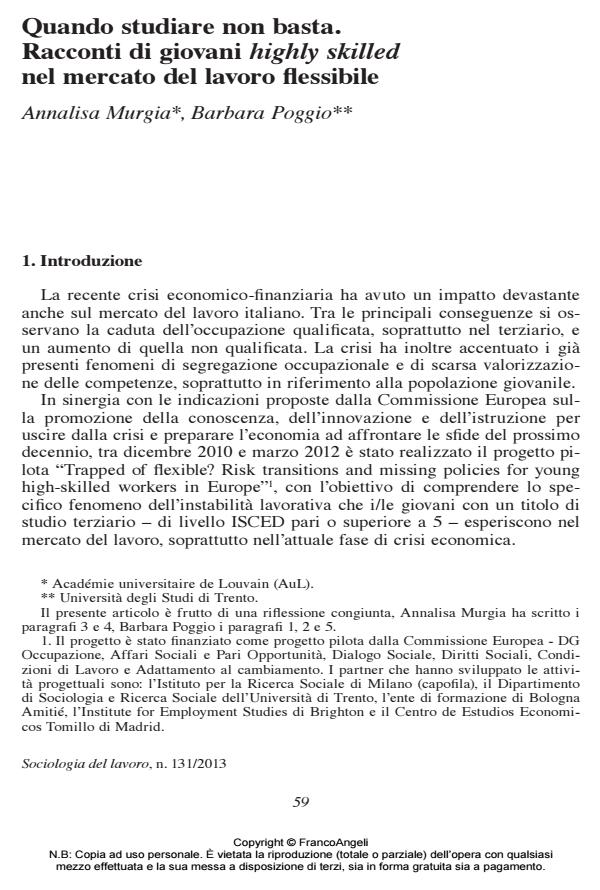When studying is not enough. Stories of highly skilled young workers in the flexible labour market
Journal title SOCIOLOGIA DEL LAVORO
Author/s Annalisa Murgia, Barbara Poggio
Publishing Year 2013 Issue 2013/131 Language Italian
Pages 15 P. 59-73 File size 311 KB
DOI 10.3280/SL2013-131004
DOI is like a bar code for intellectual property: to have more infomation
click here
Below, you can see the article first page
If you want to buy this article in PDF format, you can do it, following the instructions to buy download credits

FrancoAngeli is member of Publishers International Linking Association, Inc (PILA), a not-for-profit association which run the CrossRef service enabling links to and from online scholarly content.
In the current contribution some of the main results of a research aimed at analysing the work instability phenomenon among highly skilled young workers in Italy are discussed. After having delineated a general framework of the changes that characterise the situation of this specific segment, the outcomes of a qualitative research based upon in depth interviews are presented, with a particular focus on the temporariness of contracts, on the quality of work, on the intertwinement between work and private life and on the issue of rights and of social security. Finally, a reflexion on possible interventions to contrast the highlighted criticalities is developed, also on the basis of the outcomes of a focus group with key informants.
Keywords: Young workers, highly skilled, temporary works, quality of work, deskilling, policy perspectives
- Accornero A. (2001), “La «società dei lavori»”, Sociologia del lavoro, 80: 49-56.
- Beck U., Beck-Gernsheim E. (2002), Individualization. Institutionalized Individualism and its Social and Political Consequences, London: Sage.
- Berloffa G. e Villa P. (2010) “Differences in Equivalent Income across Cohorts of Households: Evidence from Italy”, The Review of Income and Wealth, 56, 4: 693-714, DOI: 10.1111/j.1475-4991.2010.00403.x
- Bertolini S. (2005), “Strumenti concettuali per l’analisi del mercato del lavoro atipico: riflessioni ed esperienze di ricerca”, Sociologia del lavoro, 97: 80-101.
- Berton F., Richiardi M. e Sacchi S. (2009), Flex-insecurity. Perché in Italia la flessibilità diventa precarietà, Bologna: il Mulino.
- Bologna S. e Fumagalli A. (1997), Il lavoro autonomo di seconda generazione. Scenari del postfordismo in Italia, Milano: Feltrinelli.
- Borella M. e Segre G. (2008), Le pensioni dei lavoratori parasubordinati: prospettive dopo un decennio di gestione separata, WP Cerp, 78/08.
- Brophy E. e de Peuter G. (2007), “Immaterial Labour, Precarity, and Recomposition by”, in McKercher C. e Mosco V., a cura di, Knowledge Workers in the Information Society, Lanham: Lexington Books.
- Casey C. (1995), Work, Self and Society after Industrialism, London: Routledge.
- Castagnetti C. e Rosti L. (2010), Gender stereotyping and wage discrimination among Italian graduates, MPRA, WP n. 26685.
- Castel R. (1995), Les Métamorphoses de la question sociale. Une chronique du salariat, Paris: Fayard.
- Chicchi F. (2001), Derive sociali. Precarizzazione del lavoro, crisi del legame sociale ed egemonia culturale del rischio, Milano: FrancoAngeli.
- Di Pierro D. et al. (2009), “Le retribuzioni mancanti”, in Berton F., Richiardi M.
- e Sacchi S., a cura di, Flex-insecurity. Perché in Italia la flessibilità diventa precarietà, Bologna: il Mulino.
- Giannini M. e Caputo G. (2007), “La casa senza radici: flessibilità lavorativa e condizione abitativa di giovani coppie napoletane”, in Piccone Stella S., a cura di, Tra un lavoro e l’altro. Vita di coppia nell’Italia post-fordista, Roma.
- Murgia A. e Poggio B. (2013), “La trappola della passione. Esperienze di precarietà dei giovani highly skilled in Italia, Spagna e Regno Unito”, in Cordella G.
- e Masi S.E., a cura di, Condizione giovanile e nuovi rischi sociali. Quali politiche?, Roma: Carocci.
- Murgia A., Poggio B. e Torchio N. (2012), “Italy: precariousness and skill mismatch” in Samek Lodivici M. e Semenza R., a cura di, Precarious Work and Young Highly Skilled Workers in Europe. Risk Transitions and Missing Policies, Milano: FrancoAngeli.
- Villa P. (2011), “I giovani e il mercato del lavoro in Italia”, La Rivista delle Politiche Sociali, 3: 13-42.
- The Crisis Tsunami. Social Representations of the Economic Crisis in the Italian Press Valentina Rizzoli, Diego Romaioli, Alberta Contarello, in International Review of Social Psychology /2017 pp.80
DOI: 10.5334/irsp.103
Annalisa Murgia, Barbara Poggio, Quando studiare non basta. Racconti di giovani highly skilled nel mercato del lavoro flessibile in "SOCIOLOGIA DEL LAVORO " 131/2013, pp 59-73, DOI: 10.3280/SL2013-131004